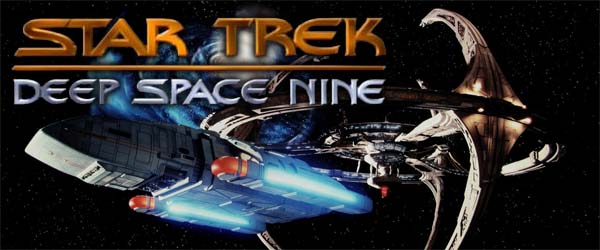
In the age of streaming and binge-watching here in the year 2023, long-form serialized television is now ubiquitous. Every network and streaming service has wanted its own blockbuster TV shows. Whether it's AMC's The Walking Dead and Breaking Bad, HBO's Game of Thrones, Sci-Fi's Battlestar Galactica, Netflix's House of Cards and Stranger Things, History's Vikings, and so forth, it seems that every big new show outside of sit-coms has a heavily-serialized format. Procedural dramas are going the way of the dinosaur.
Serialized, long-form television may be commonplace now, but back in the 1990's, it was virtually unheard of outside of daytime soap operas (such as Dallas and Dynasty) and the occasional network mini-series. At least, this was the case in the United States. British television has a much longer track record of serialized story-telling. A big part of why serialized television was uncommon was that the producer(s) of network syndicacted shows didn't have as much control over when its affiliates decided to air the shows, or how heavily they would market and advertise it. Furthermore, the networks or affiliates could change the time slot of the show pretty much at a whim. Viewership, therefore, would be much more fickle and fractured. Audiences would pop in and drop out. Expecting the audience to have seen every previous episode in preparation for this week's episode was a dangerous and risky expectation for a production studio. It's easy to lose viewers if none of them know what's going on.
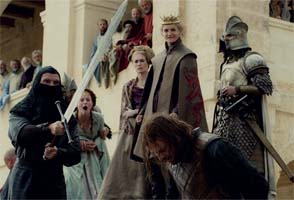 - Game Of Thrones, copyright HBO
- Game Of Thrones, copyright HBO
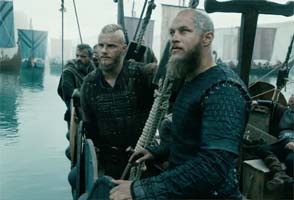 - Vikings, copyright History Channel
- Vikings, copyright History Channel
Highly serialized, long-form drama are the norm for modern networks and subscription television services.
As I mentioned in the previous essay, this was the case with me. I was in elementary school and middle school during DS9's run, and I missed a lot of episodes in the first couple seasons, despite wanting to watch the show. Missing so many episodes meant that I had very little idea what was going on when I would watch, and so I mostly lost interest in the show. If my dad was watching it, and I was there, I'd watch it, but I wasn't planning my day around it.
Looking back now, that sort of serialized story-telling is now ubiquitous and expected, and so it's easier to recognize that Deep Space Nine was truly innovative and ahead of its time in this regard.
Long-form story-telling
Serialized story-telling wasn't alien to Star Trek. Deep Space Nine premiered in 1993, the same year as the sixth season of Next Generation. By this time, The Next Generation had several story threads that had recurred over the course of a season, or over multiple seasons -- as well as several attempted overarching plot threads that were dropped.
As early as the first season of Next Generation, Q had become a recurring antagonist, and his "judgement" over the human race was established as a recurring plot thread. Heck Q's judgement of humanity was originally depicted as the framing mechanism for the entire show! It was scaled back in the following seasons due to the general poor reception of the first season, and the fact that John de Lancie just works better in a more whimsical and comic role.
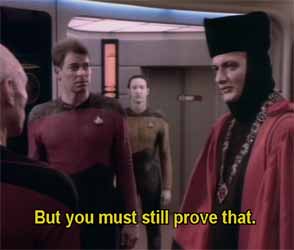 - TNG "Encounter At Farpoint", season 1, episode 1
- TNG "Encounter At Farpoint", season 1, episode 1
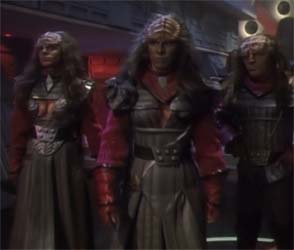 - TNG "Redemption, Part I", season 4, episode 26
- TNG "Redemption, Part I", season 4, episode 26
TNG had several recurring plot threads.
The final two episodes of Next Generation's first season, "Conspiracy" and "The Neutral Zone", seem to have been part of an abandoned attempt at more long-form story-telling. Both seem to be trying to establish some new threat to the Federation (and possibly a shared threat between the Federation and other rival powers such as the Romulans). I think the original idea was for this to become an overarching storyline for the entire series. But the thread from "Conspiracy" was completely dropped, and the destroyed colonies referenced in "The Neutral Zone" were re-written to be retroactive foreshadowing of the Borg's appearance in season 2.
[More]
cddb26c9-ca5a-4327-b199-d0d00dec522b|0|.0
Tags:Star Trek, Star Trek: Deep Space Nine, Federation, Starfleet, progressivism, humanism, secularism, religion, fundamentalism, fascism, terrorism, war, trans-gender, Worf, Odo, Quark, Moogie, Ishka, Bajor, Dominion, Founder, Changeling, Jem'Hadar, Cardassian, streaming television, Game of Thrones, Battlestar Galactica, the X-Files, Babylon 5, Buffy the Vampire Slayer, The Sopranos, Lost, Twin Peaks
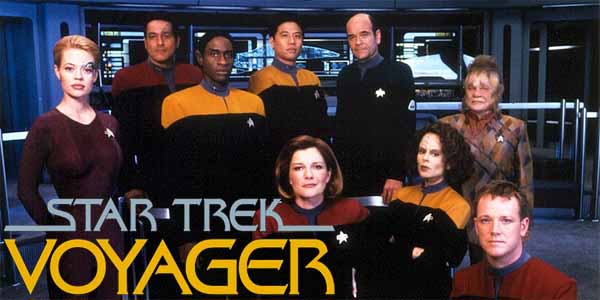
In my last post, I vented some of my frustrations with Star Trek: Voyager. Primarily, I ranted about how the series mostly failed to follow through with its central premise of being about the ship being lost and isolated on the other side of the galaxy. But I still have more complaints with Voyager. A side effect of the show not following its "lost and alone" premise to its logical conclusion, the show ended up feeling like it was trying too hard to be a Next Generation copy-cat.
Steve Shives also brought up this complaint in his Youtube video "What's My Problem With Voyager?", and I echo the criticism. Voyager had the frustrating habit of retelling stories that had already been told (usually better) in Next Generation. Star Trek shows have always repeated archetype characters, but TNG and Deep Space Nine were very good about paying homage to the earlier shows, without outright copying them.
Many characters feel like slight variations of characters from TOS and TNG.
For example, it could be argued that Data in TNG is a copy-cat of Spock. Dr. McCoy, after all, frequently referred to Spock as a "computer", and Mr. Data is [literally] a computer. But Data isn't a copy-cat of Spock. He's actually more a reflection of Spock (though, admittedly, Spock's arc in the movies and in "Unification" does paint him as being more similar to Data). Spock (in the Original Series) derided his humanity and fought very hard to subdue and quell it. Spock was like a Dr. Jekyll who thought his human half was the monstrous Mr. Hyde. Data, on the other hand, inverts this concept and is more of a Pinocchio (which Riker explicitly spells out for us in "Encounter At Farpoint").
Data wasn't a copy of Spock, he was an inverted reflection.
Also, Spock was dueling with his human half throughout the Original Series and into the movies. That's a dynamic that isn't present in Data at all. That dynamic is present, however, in Worf! Then, of course, there's the whiz kid element of Spock's character, which was transcribed onto Wesley in TNG. So TNG took inspiration from the Original Series' most popular character (Spock), but instead of copying him with minor variations, it split Spock's attributes into multiple characters.
[More]
2c5a81e1-f421-43b4-a73f-c4e9164e3c2a|0|.0
Tags:Star Trek, Star Trek: Voyager, U.S.S. Voyager, Star Trek: the Next Generation, Star Trek: Deep Space Nine, Delta Quadrant, Starfleet, Maquis, Kazon, Hirogen, Borg, Kathryn Janeway, Seven of Nine, The Doctor, Kes, Chakotay, Tuvok, Neelix, Tom Paris, B'Elanna Torres, Harry Kim, Borg Queen, Boothby, Reginald Barclay, Q, Data, Spock, Worf, Quark
|

| 12 | | | | | | | 60 | | 11 | | | | | | | 55 | | 10 | | | | | | | 50 | | 09 | | | | | | | 45 | | 08 | | | | | | | 40 | | 07 | | | | | | | 35 | | 06 | | | | | | | 30 | | 05 | | | | | | | 25 | | 04 | | | | | | | 20 | | 03 | | | | | | | 15 | | 02 | | | | | | | 10 | | 01 | | | | | | | 05 |
|